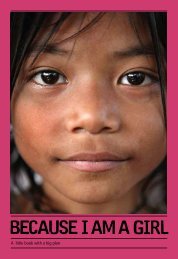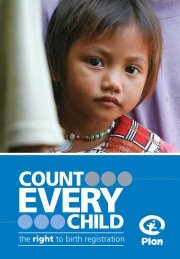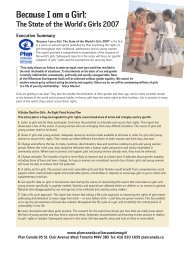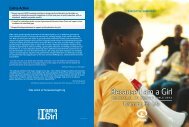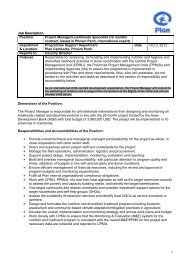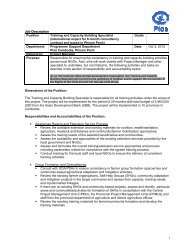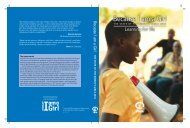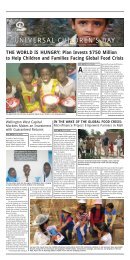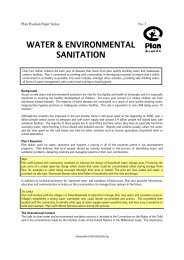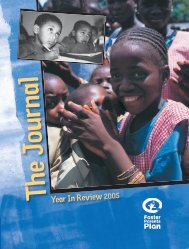Plan Worldwide Annual Review and Combined Financial ...
Plan Worldwide Annual Review and Combined Financial ...
Plan Worldwide Annual Review and Combined Financial ...
You also want an ePaper? Increase the reach of your titles
YUMPU automatically turns print PDFs into web optimized ePapers that Google loves.
<strong>Plan</strong>’s global spend in 2012<br />
€60 million<br />
Strengthening our<br />
response<br />
Big disasters reconfigure lives <strong>and</strong> l<strong>and</strong>scapes <strong>and</strong><br />
devastate communities – children are often the<br />
worst hit. <strong>Plan</strong>’s immediate response is to meet the<br />
urgent needs of children (such as food <strong>and</strong> water).<br />
<strong>Plan</strong> prioritises child protection <strong>and</strong> education to<br />
re-establish a sense of security <strong>and</strong> normality.<br />
Child-friendly spaces help to ensure children’s<br />
safety <strong>and</strong> help to heal emotionally. A key focus<br />
is to safeguard children from harm <strong>and</strong><br />
exploitation both during <strong>and</strong> after disasters.<br />
In Liberia, <strong>Plan</strong>’s integrated education <strong>and</strong> child<br />
protection programme is responding to the<br />
growing influx of refugees from the Cote D’Ivoire<br />
by establishing child welfare committees (made<br />
up of Liberians <strong>and</strong> refugees of all ages <strong>and</strong> both<br />
genders) in 18 communities. The members are<br />
being trained to respond to <strong>and</strong> prevent child<br />
abuse, exploitation, violence <strong>and</strong> neglect.<br />
In the face of the growing number of emergencies,<br />
we have strengthened our response in a number of<br />
ways, including delivering training, recruiting more<br />
operational <strong>and</strong> technical experts, <strong>and</strong> revising our<br />
systems to improve performance. “The big difference<br />
we can make in a country is largely due to our<br />
disaster preparedness process, a capacity-building<br />
exercise unique to <strong>Plan</strong>,” says Dr Unni Krishnan,<br />
<strong>Plan</strong>’s Head of Disaster Preparedness <strong>and</strong> Response.<br />
“Remarkable progress” in<br />
disaster risk management<br />
In 2012, <strong>Plan</strong> engaged an independent consultant<br />
to review our progress in implementing our disaster<br />
risk management work against our 2009 policy.<br />
The review identified “remarkable progress” in<br />
practically all aspects of our work in this field,<br />
including better emergency responses, effective<br />
alert systems <strong>and</strong> preparedness processes,<br />
<strong>and</strong> increased fundraising.<br />
The review also identified some areas for<br />
improvement, such as <strong>Plan</strong>’s response to slow-onset<br />
disasters. Slow recruitment or procurement can<br />
lead to poor performance, <strong>and</strong> we are working to<br />
improve in these areas. “We don’t want separate<br />
procurement processes in emergencies – we want<br />
good processes that can be carried out quickly,”<br />
says Roger Yates, Director of Disaster Management.<br />
<strong>Plan</strong> on the global stage<br />
Sub-Saharan Africa<br />
Broadening our reach to meet the need<br />
<strong>Plan</strong> is developing the flexibility to address emergencies<br />
wherever they occur, even if these are beyond our<br />
established programme areas. For example, in 2012,<br />
food crises <strong>and</strong> drought took us into new areas of<br />
operation in the Sahel <strong>and</strong> the Horn of Africa.<br />
In the Sahel, <strong>Plan</strong> deployed more than 31 disaster<br />
response experts in five countries, focusing on<br />
access to food, child protection, education, water<br />
<strong>and</strong> sanitation, <strong>and</strong> children’s health. In Burkina Faso,<br />
we built two boreholes, 96 latrines <strong>and</strong> 81 showers<br />
at three refugee camps, benefiting 16,620 refugees.<br />
We also established 16 primary school classes <strong>and</strong><br />
five preschool classes, <strong>and</strong> distributed school kits<br />
benefiting 993 children in two refugee camps.<br />
In the Horn of Africa, we set up ongoing programmes<br />
in five drought-stricken areas new to <strong>Plan</strong>, to help<br />
nearly 1.2 million people, including children, rebuild<br />
their lives. We raised €23.2 million <strong>and</strong> provided food<br />
to communities <strong>and</strong> supplementary feeding in schools<br />
<strong>and</strong> health centres, as well as water, health<br />
<strong>and</strong> sanitation training <strong>and</strong> facilities.<br />
<strong>Plan</strong> has become a key player in child-centred disaster risk reduction. <strong>Plan</strong>:<br />
• is the deputy chair of the Sphere Project to improve quality <strong>and</strong> accountability in the humanitarian sector<br />
• is a member of the Humanitarian Accountability Partnership<br />
• sits on global working groups on Education in Emergencies <strong>and</strong> Child Protection in Emergencies<br />
• is a member of the UN Inter-agency St<strong>and</strong>ing Committee Reference Group on Mental Health <strong>and</strong> Psychosocial Support in Emergencies<br />
• <strong>Plan</strong>’s Director of Disaster Risk Management is a member of the board of the International Council of Voluntary Agencies.<br />
DISASTER RISK MANAGEMENT<br />
21



